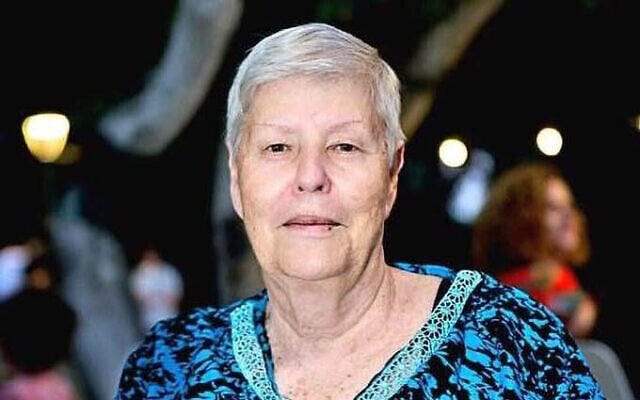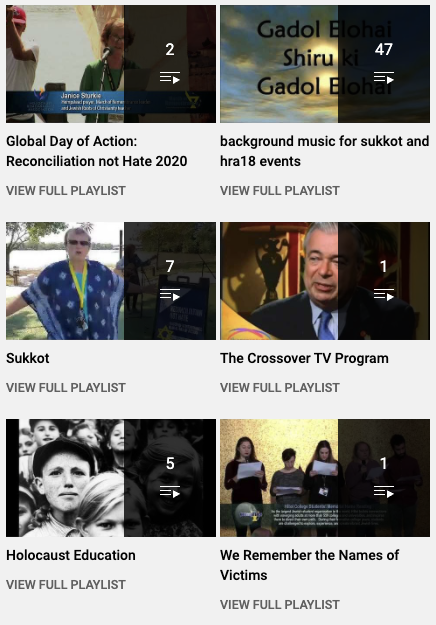I first wanted to highlight two articles which I felt were worth sharing at the top of this update (both have been included in previous updates):
- Report: Questionable Counting: Analysing the Death Toll from the Hamas-Run Ministry of Health in Gaza by Andrew Fox with The Henry Jackson Society
- The cult of the keffiyeh: How pitying Palestine and hating Israel became the ultimate luxury belief by Brendan O’Neill in spiked
A quick personal note: thank you for subscribing and sharing this update, and I truly hope you find it resourceful. What started as a small e-mail with friends and family who were curious as to what I was reading has now grown to a Substack with tens of thousands of readers (wow!)! I am not and will never pretend to be a journalist. My goal is simply to arm you with accurate information, analysis, and opinions of what many subject matter experts and publications that I follow are saying. You are welcome to share this with others and subscribe via the link below.
Wishing all of you a Happy Hanukkah and Merry Christmas! Am Israel Chai (the people of Israel live!)
Situational Update
- The Times of Israel reports: The army says a missile fired by Yemen’s Houthis was intercepted before entering Israeli airspace. This is the second night in a row in which the Iran-backed group has fired a ballistic missile at central Israel, in what has become a near-nightly occurrence.
- Per the Foundation for Defense of Democracies (FDD): The Israeli Air Force carried out “precise strikes” on December 19 against military targets in Houthi rebel-controlled areas of Yemen, including the capital city of Sana’a. The IDF said that the strikes were aimed at harming the Iran-backed Houthi “terrorist regime” and “preventing the exploitation” of infrastructure for “military and terrorist” purposes, including smuggling illegal weapons shipments from Iran. Israeli Prime Minister Benjamin Netanyahu described the Houthis as “almost the last arm of Iran’s axis of evil,” following the IDF’s severe degradation of Iranian proxies Hamas in Gaza and Hezbollah in Lebanon. Netanyahu added that Israel would exact a “very heavy price” from the Houthis if its attacks on Israel continued. Netanyahu pointed out that the Houthis are “are not just attacking” Israel but “the entire world. They are attacking the international shipping lanes. Thus, when Israel takes action against the Houthis, it is acting on behalf of the entire international community.”
The Numbers
Casualties
- 1,816 Israelis have been killed including 821 IDF soldiers since October 7th (+3 since Sunday)
- Three soldiers were killed by an explosive device at the entrance to a building in the Beit Hanoun area which is in Northern Gaza.
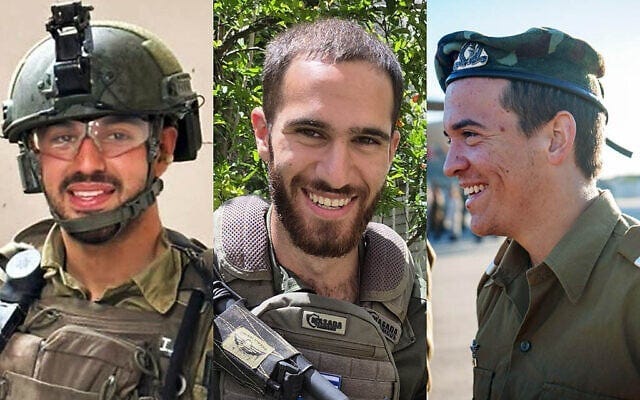
- Sergeant First Class (res.) Hillel Diener (21)
- First Sergeant Netanel Pesach (21)
- Captain Ilay Gavriel Atedgi (22)
- The South: 389 IDF soldiers during the ground operation in Gaza have been killed (+3 since Sunday)
- The North: 131 Israelis (84 IDF soldiers) have been killed during the war in Northern Israel (no change since Sunday)
- Additional Information (according to the IDF):
- 2,494 (+3 since Sunday) IDF soldiers have been injured during ground combat in Gaza, including at least 471 (no change since Sunday) who have been severely injured.
- 5,522 (+14 since Sunday) IDF soldiers have been injured since the beginning of the war, including at least 805 (+2 since Sunday) who have been severely injured.
- According to unverified figures from the Hamas-controlled Gaza Health Ministry, 45,259 (+162 since Sunday) people have been killed in Gaza, and 107,627 (+383 since Sunday) have been injured during the war.
- Facts About the Gaza Casualty Count:
- Report: Questionable Counting: Analysing the Death Toll from the Hamas-Run Ministry of Health in Gaza by Andrew Fox with The Henry Jackson Society
- On October 7th, Ohad Hemo with Channel 12 Israel News – the country’s largest news network, a leading expert on Palestinian and Arab affairs, mentioned an estimate from Hamas: around 80% of those killed in Gaza are members of the organization and their families.”
- The article goes on to say: “In an N12 article that came out this morning, Hemo also pointed out that since the elimination of key leader Ismail Haniyeh, Hamas’s top echelon has gone underground and fled Iran and Lebanon, with some relocating to Turkey and Qatar – with the hope that Israel will not strike them there.
- Read this well documented piece from Tablet published in March: How the Gaza Ministry of Health Fakes Casualty Numbers
- The Associated Press, an outlet with a demonstrated anti-Israel bias, conducted an analysis of alleged Gaza death tolls released by the Hamas-controlled “Gaza Health Ministry.” The analysis found that “9,940 of the dead – 29% of its April 30 total – were not listed in the data” and that “an additional 1,699 records in the ministry’s April data were incomplete and 22 were duplicates.”
- The Israeli Ministry of Foreign Affairs publishes official details on every civilian and IDF casualty.
Hostages
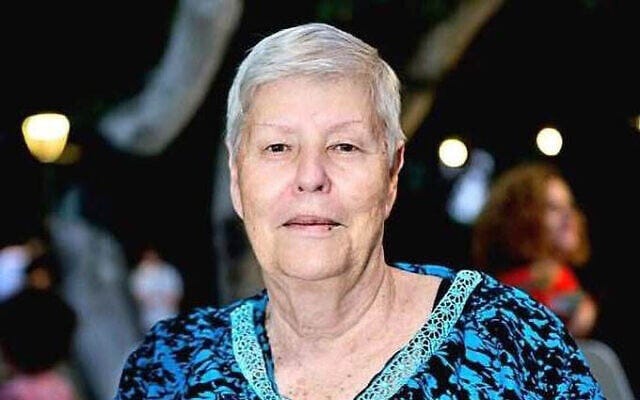
- Per the Times of Israel: Hanna Katzir, who endured seven weeks of Hamas captivity in the Gaza Strip last year, has died at age 78 after months of struggling with medical complications from her time as a hostage, her hometown of Kibbutz Nir Oz announced Tuesday.
- Katzir was kidnapped from her home in the kibbutz during the Hamas onslaught of October 7, 2023. She was released on November 24 as part of a Qatar-negotiated temporary ceasefire deal, just days after the Palestinian Islamic Jihad terror group falsely claimed she had been killed in an IDF airstrike.
- On Tuesday, she became the first former hostage from the October 7 assault to die after her release.
- Katzir’s husband, Rami, 79, was killed during the attack and her son Elad was taken hostage and later killed. According to the IDF, Elad was likely killed by his captors in January. His body was recovered in April.
- Hanna Katzir only learned about her husband’s murder and her son’s abduction after returning from captivity.
- There are currently 96 hostages taken on 10/7 currently in captivity in Gaza
- 7 hostages are Americans: Meet the Seven American Hostages Still Held By Hamas
- On October 7th, a total of 261 Israelis were taken hostage.
- During the ceasefire deal in November, 112 hostages were released.
- 145 hostages in total have been released or rescued
- The bodies of 38 hostages have been recovered, including 3 mistakenly killed by the military as they tried to escape their captors.
- 8 hostages have been rescued by troops alive
- This leaves 100 hostages still theoretically in Gaza
- At least 34 confirmed bodies are currently being held in Gaza
- 30-50 hostages are assumed to be dead and held in captivity
- Thus, at most, 50-70 living hostages could still be in Gaza.
- Hamas is also holding 2 Israeli civilians who entered the Strip in 2014 and 2015, as well as the bodies of 2 IDF soldiers who were killed in 2014.
Listen
[PODCAST] Call Me Back with Dan Senor: The Hostage Negotiations – with Nadav Eyal
Watch
I highly recommend watching the full 60 Minutes segment on Israel’s incredibly successful pager operation against Hezbollah.
The Syria Breakdown: Why Assad Fell by Andrew Tabler with the Washington Institute for Near East Policy
Humanitarian Aid
Jonathan Sacerdoti comments on a report from Israel’s Channel 12: Staggering images of waste and dishonesty: for the first time since the war began, TV cameras have been in Gaza to the holding area where aid is unloaded on the Palestinian side of the Kerem Shalom crossing. Almost 60,000 trucks have entered since the war started. Vast amounts remain sitting in this area undistributed by international aid agencies for many months, much of it now expired.
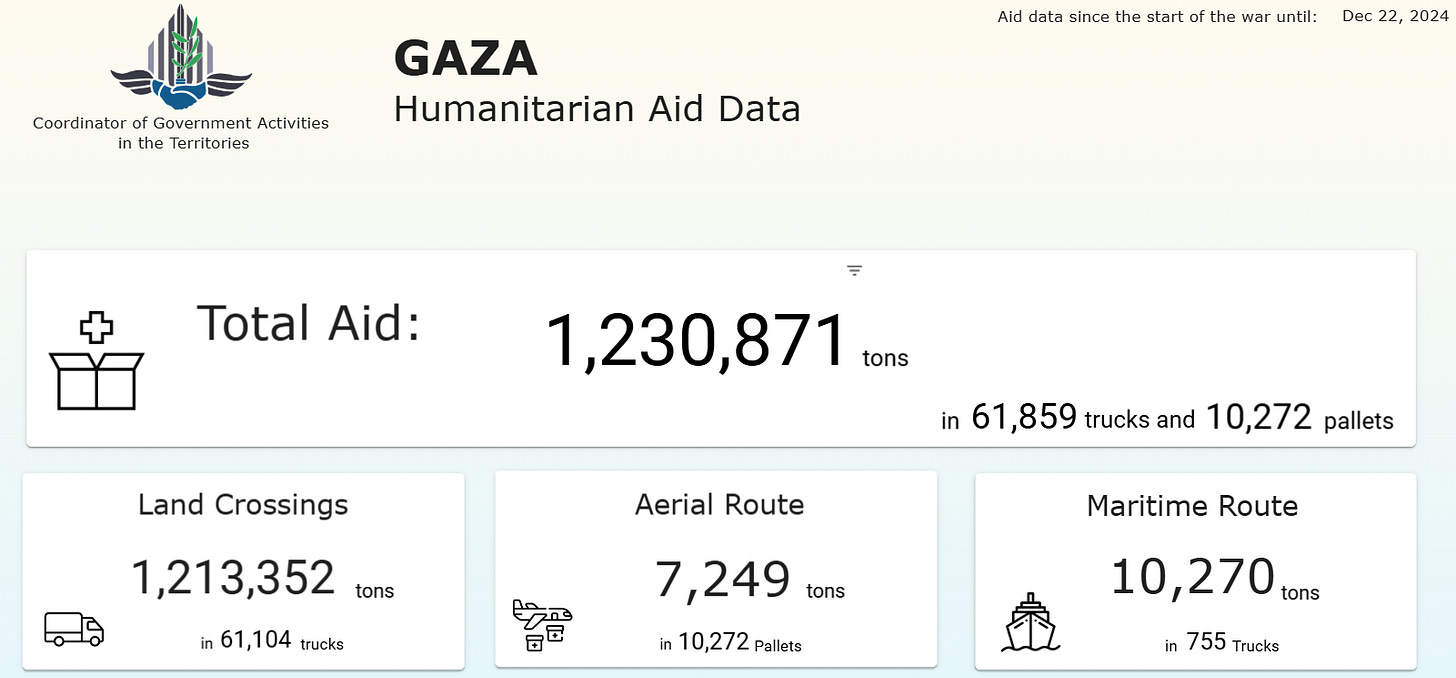
Source: Israel Humanitarian efforts – Swords of Iron
Rocket Alerts

- 667 rocket alerts originated from the Houthis in Yemen since 12/1
- The image below is from last night alone in central Israel (over 184 rocket alerts and counting)
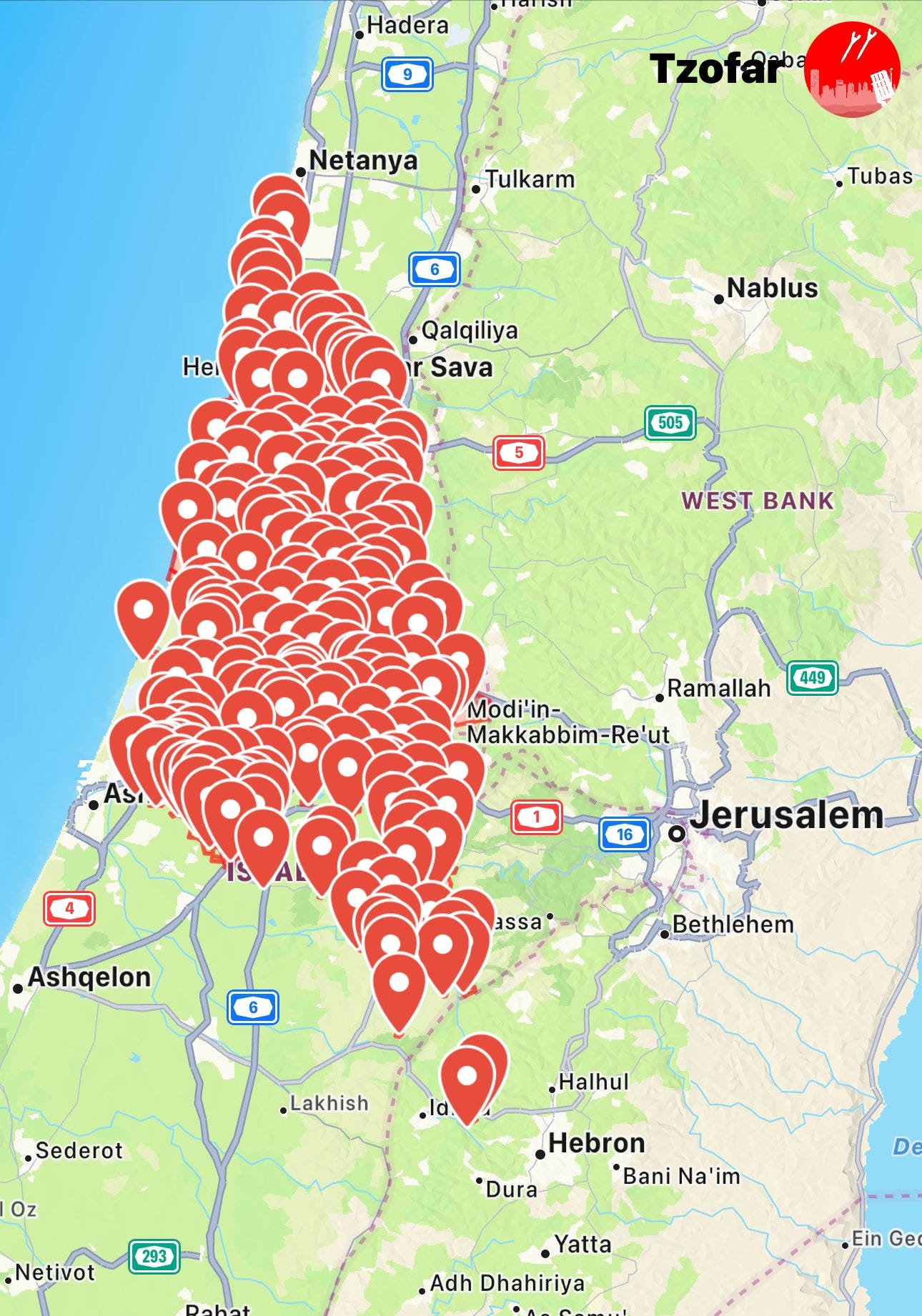
Source: Rocket Alerts in Israel
Israel
Benjamin Netanyahu: The Inside Story of Israel’s Victory: An Interview by Elliot Kaufman in the WSJ
- “On Oct. 7, they woke me up at 6:29 in the morning,” Mr. Netanyahu says. That’s hours after senior security officials knew something was awry, but there’s no getting around the failure. Hamas death squads slaughtered nearly 1,200 Israelis. By this time, “there was a full-scale attack from Gaza,” he says. “It was clearly not just another round. I went to the Kirya, our military headquarters, called the cabinet and declared war,” Mr. Netanyahu says. “And I said it’s going to be a long war.”
- On Oct. 11, “the defense minister and the military chiefs suggested we go after Lebanon. That is, shift the whole war north, against Hezbollah, and leave Hamas intact in the south,” Mr. Netanyahu says. “I said, ‘we can’t do that.’ ” The perpetrators of the Oct. 7 massacre couldn’t be left to stew, and “we shouldn’t conduct a two-front war. One massive front at a time.”
- As Israel advanced on the ground, “Hamas saw us moving, moving, moving with American support,” he says. “There was not yet the buildup of public pressure against us.” That, Mr. Netanyahu says, scared Hamas into the first hostage deal, in late November 2023, and assured him that he could briefly stop the fighting.
- The more Americans, international bodies and liberal Israelis pressed Mr. Netanyahu to fold, the less inclined Hamas became to cut a second hostage deal—“and Hamas said so openly.”
- “The U.S. withheld critical weapons,” Mr. Netanyahu admits, but he appreciates the pressure Mr. Biden was under. “It’s not easy to be president, let’s face it, with these very radical fringes in his party. It wasn’t easy to do what Mr. Biden did,” including helping Israel in its defense against Iranian missile attacks, he says.
- “We prepared for Hezbollah a massive surprise,” Mr. Netanyahu says, and I presume he means the exploding pagers on Sept. 17. When attacking Hezbollah was first contemplated, nearly a year earlier, this surprise “was barely considered, if at all, because at that time those capabilities had not yet been amassed. Their lethality was but a fraction of their full force a year later,” he says.
- The expectation, in Israel and America, was that Hezbollah’s response would be like nothing Israel had seen before, toppling towers in Tel Aviv. But the terrorists had been stunned, and because of what Israel did next, they were unable to retaliate effectively.
- Raw intelligence convinced Mr. Netanyahu to kill Nasrallah. “He was literally taking over the command of the military actions. But the thing that startled me was that I realized he was the axis of the axis,” Mr. Netanyahu says. “He had replaced [Qassem] Soleimani,” the Iranian general who was killed in a January 2020 U.S. strike. “It’s not only that Iran was using him. He was using Iran.”
- Mr. Netanyahu says Iran “spent probably $30 billion in Syria, another $20 billion in Lebanon, God knows how much on Hamas. And it’s all gone down the tubes,” he says. “They have no supply line.”
- The hostage deal Mr. Netanyahu envisions is a partial one in exchange for a pause in the fighting. “I’m not going to agree to end the war before we remove Hamas,” he says. “We’re not going to leave them in power in Gaza, 30 miles from Tel Aviv. It’s not going to happen.”
- Link: Benjamin Netanyahu: The Inside Story of Israel’s Victory
How the International Community Can Best Help the Palestinians by Khaled Abu Toameh with the Gatestone Institute
- Had the international community held the Palestinian Authority (PA) accountable for financial and administrative corruption after the signing of the Oslo Accords 30 years ago, the Iran-backed Hamas terrorist group would not have gained popularity among Palestinians.
- Although many Palestinians support Hamas’s policy of rejecting Israel’s right to exist, the Islamist group’s victory greatly reflected the desire of the Palestinian public to end corruption in the PA government and institutions.
- Public opinion polls conducted before the elections showed that 87% of Palestinians believed that corruption exists in PA institutions. The polls, in addition, showed that a majority of Palestinians believed that Hamas was more able to fight corruption (46% for Hamas vs. 37% for Fatah).
- The international community chose to turn a blind eye to the corruption of the Palestinian Authority under the leadership of Arafat. Many Western journalists covering Palestinian affairs also failed to report on the runaway corruption in PA institutions. Had the journalists reported on the issue, it is possible that taxpayers in the donor countries would have put pressure on their governments to hold the PA leadership accountable for depriving their people of the international aid.
- Arafat did not want the world to know about the corruption and mismanagement in PA institutions.
- The most common forms of corruption seem to be the offenses of favoritism, nepotism, embezzlement of public funds, breach of trust, abuse of power, bribery and money laundering.
- The destruction of Hamas’s military capabilities by Israel should be viewed as a positive development, but it is unlikely to decrease Hamas’s popularity among the Palestinians.
- The best way to undermine Hamas and help the Palestinians is by offering the people a better alternative to the Islamist movement. The current Palestinian Authority leadership is just not seen by many Palestinians as a better alternative to Hamas. That is because the United States, European Union and other donors are not banging on the table and demanding an end to the PA’s authoritarian and corrupt conduct.
- Link: How the International Community Can Best Help the Palestinians
Tehran must be defeated before Sanaa by Ben-Dror Yemini in Ynet
- This isn’t a proper state – it’s a terrorist organization that has seized control of half a country. Ranked 183rd out of 191 countries, Yemen has an annual per capita income of just $477 (compared to $3,372 in the Palestinian territories). Around two-thirds of its population – roughly 30 million people – live with food insecurity or outright hunger.
- This follows a grim pattern seen across Lebanon, Syria, Gaza, Somalia, Sudan and elsewhere: Whenever jihad, whether Shiite or Sunni, rises, the inevitable outcome is destruction, devastation and bloodshed.
- The Houthis, who dominate northern Yemen, have no interest in fostering prosperity or welfare. Millions of Yemenis go hungry, but the ruling faction wields Iranian-supplied military power that disrupts global trade routes and fires ballistic missiles toward Israel. Their motto is explicit: “Death to America, Death to Israel, Curse upon the Jews, Victory to Islam.” In many respects, Yemen mirrors Lebanon: a bankrupt, failing state where a terrorist organization consolidates its grip through Iranian support.
- …for every UAV or missile launched at Israel, the retaliatory damage inflicted on the Houthis is substantially more pronounced. To understand their persistence, one must grasp the Houthi mindset, which mirrors that of other jihadist groups: Causing even minor harm to Israel is worth the immense pain they themselves endure.
- There are two ways to neutralize the Houthi threat, and the two approaches complement rather than contradict each other.
- The first is to negotiate a deal for the release of hostages and establish a cease-fire. Unlike Hezbollah, the Houthis have shown they keep their word and have made it clear they won’t stop until the war ends.
- The second approach is to strike at the source—Iran. While Iran’s “ring of fire” has been weakened by significant blows to Hezbollah and the collapse of Assad’s regime in Syria, the driving force behind this axis of evil isn’t rooted in rational interests. It’s ideological at its core.
- The Houthis are a nuisance, not an existential threat. Their goal is to drag Israel into a war of attrition, assuming Israel won’t take action where the Saudis hesitated. Given the current circumstances, Iran is the far greater danger – and the far more vulnerable target.
- Link: Tehran must be defeated before Sanaa
Houthi Shipping Attacks: Patterns and Expectations for 2025 by Noam Raydan and Farzin Nadimi with the Washington Institute for Near East Policy
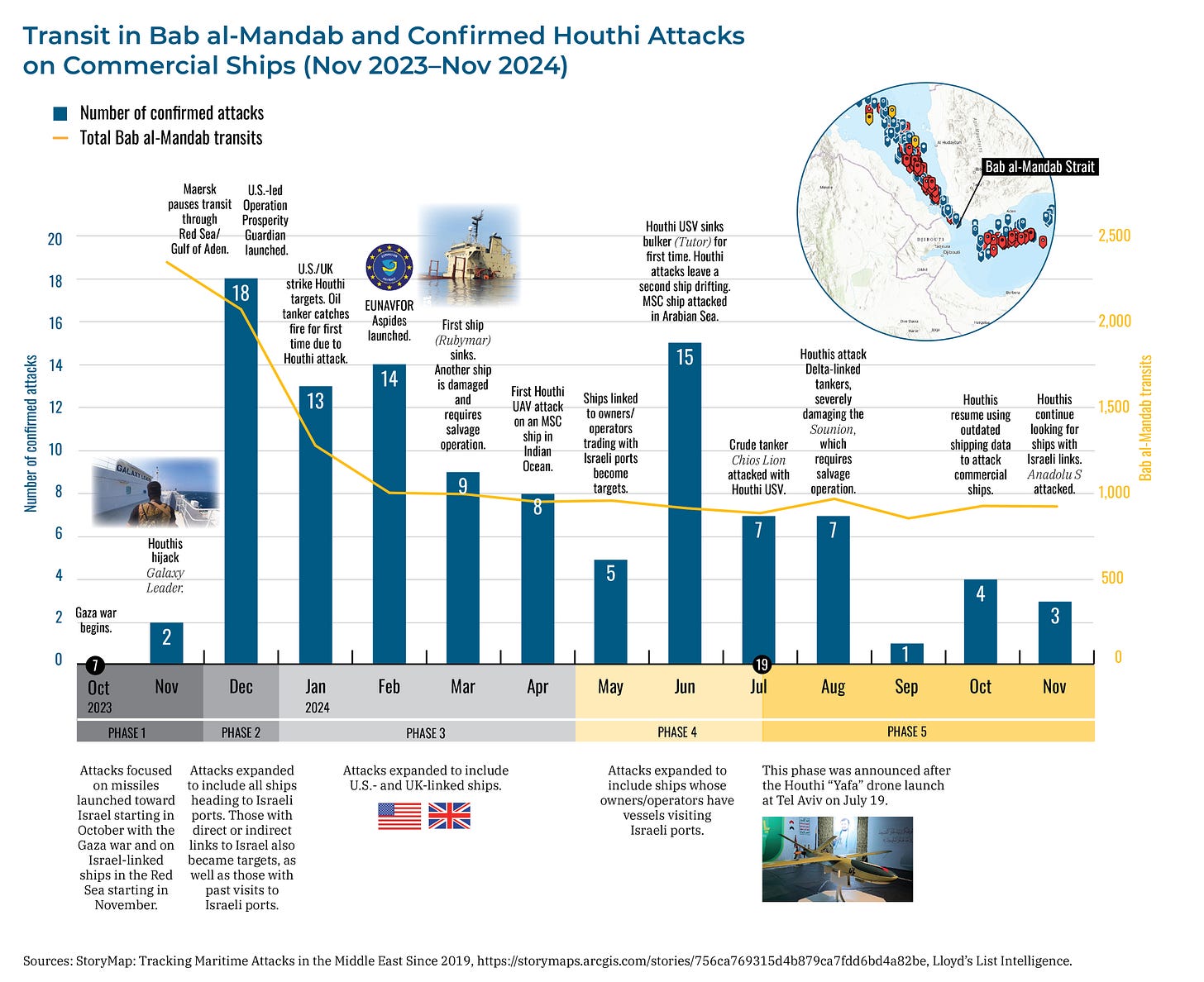
- During the Gaza and Lebanon wars, the Houthis effectively turned the Bab al-Mandab chokepoint into an antiaccess/area-denial zone. A year after they seized the car carrier Galaxy Leader (IMO 9237307) and its multinational crew in the Red Sea, the maritime domain has turned into a key sphere of operations for the Iran-backed group.
- As 2025 approaches, the current high maritime risks could either increase or gradually decrease. This will largely depend on how the incoming U.S. administration addresses the Gaza war, which the Houthis have been using to justify their attacks, and on Iran. A ceasefire in Gaza should theoretically pave the way for a diplomatic solution to the Red Sea crisis. A serious solution, however, will require the involvement of U.S. regional partners that saw transit to their ports affected by the Houthi attacks.
- Transit in the Bab al-Mandab Strait is still down by over 50 percent year-over-year. The Red Sea crisis has created challenges for regional ports and key navigational routes like the Suez Canal, where the number of transits plummeted from around 2,068 in November 2023 to about 877 in October 2024, according to data from Lloyd’s List Intelligence.
- Link: Houthi Shipping Attacks: Patterns and Expectations for 2025
Antisemitism
Amnesty International’s “Genocide” Smear Against Israel by Mark Goldfeder and Eugene Kontorovich in City Journal
- Amnesty International, an organization with a long history of anti-Israeli activism, recently released a report accusing the Jewish state of committing genocide, with Human Rights Watch jumping on the bandwagon with its own report to be released Thursday.
- …Amnesty had pre-determined that Israel was guilty, so it simply dismissed international law. “Amnesty International considers this an overly cramped interpretation of international jurisprudence,” the report notes, “and one that would effectively preclude a finding of genocide in the context of an armed conflict.”
- The real reason the ICJ’s definition precludes a finding of genocide in Israel’s armed conflict is because there is in reality no genocide.
- Amnesty also fails to substantively engage with the well-established doctrines of military necessity, proportionality, and deterrence, which govern legitimate actions during armed conflict. The law of war was not designed for armchair quarterbacks writing a report a year later, recounting events and critiquing decisions. It is given to commanders in the field to make good-faith judgment calls, in real time, based on available information.
- Amnesty feebly tries to hide Israel’s obvious lack of genocidal intent by cobbling together an assortment of distorted and out-of-context statements allegedly made by Israeli politicians.
- Heated rhetoric does not constitute evidence of genocidal intent. According to United Nations jurisprudence, incitement to genocide cannot be “a mere vague or indirect suggestion.” The United States did not commit genocide when it destroyed ISIS, even though President Barack Obama spoke of the war as “eradicating a cancer.” And though Netanyahu has described the battle in Gaza as between “the children of light and the children of darkness”— a quote that Amnesty deems “dehumanizing”—the prime minister’s remarks are similar with those of Franklin D. Roosevelt, who in 1941 spoke of “victory of justice and righteousness over the forces of savagery and barbarism.”
- As for HRW, they claim Israel is committing “genocide” by depriving Gazans of water—despite the fact that some 90 percent of the territory’s water supply comes from its own aquifer, with which Israel has not interfered.
- The rapid-fire release of Amnesty and HRW’s reports is yet another example of the rhetorical arms race against the Jewish state. When the “occupation” smear was inadequate to discredit Israel, NGOs in concert shifted to the “apartheid” libel. When that did not stick, they pivoted to “genocide.”
- The genocide accusation against Israel does not just distort facts; it abuses the language of international law and cheapens the horrors of genocide. Americans who care about the state of Israel—and the integrity of language—should reject it.
- Link: Amnesty International Baselessly Accuses Israel of “Genocide”
An Absence at Auschwitz in The New York Sun
- The word is hard to find for the latest news out of Poland, which is inviting world leaders to mark the 80th anniversary of the liberation of Auschwitz-Birkenau, the labor and death camp where more than one million people perished, something like nine in ten of them Jews. All are welcome, except for — wait for it — the elected leader of the Jewish state, who is instead threatened with arrest if he steps foot on Polish soil to pay homage to those who perished.
- …a Polish deputy foreign minister declared, according to the Polish-language newspaper Rzeczpospolita, that if Mr. Netanyahu showed up he would be arrested. This is supposedly its obligation to the International Criminal Court.
- Arresting a Jew at Auschwitz would make a scene, but, Mr. Bartoszewski claims, “we are obliged to respect the provisions of the International Criminal Court.”
- As Israel noted in a recent filing at the Hague, it is not a party to the Rome Statute that established the criminal court, so the ICC has no jurisdiction over its citizens. Why would Poland disagree on such a fundamental and commonsense rule?
- The answer is rooted less in jurisprudence than in geopolitics. President Macron was eager last month to get credit for arranging a cease-fire between Israel and Hezbollah. Israel argued that France couldn’t be an honest broker if it vows to arrest Mr. Netanayahu. America agreed. So Paris said it wouldn’t arrest him.
- …there might be other considerations. As our Benny Avni reports, Warsaw’s relations with Jerusalem are marred by its effort to suppress claims of Polish complicity in the Holocaust. Under a new law, Poland could imprison anyone saying that some Poles abetted the Nazi murder machine. Calling Auschwitz, Treblinka, Sobibor, and the like “Polish death camps” is forbidden.
- All of which underlines the capricious nature of what is called international jurisprudence. Kafkaesque rules allow a country that is fighting Iran proxies who commit crimes against humanity to be accused of committing such crimes.
- Link: An Absence at Auschwitz
Sources: JINSA, FDD, IDF, AIPAC, The Paul Singer Foundation, The Institute for National Security Studies, the Alma Research and Education Center, Yediot, Jerusalem Post, IDF Casualty Count, the Washington Institute for Near East Policy, Institute for the Study of War, and the Times of Israel
